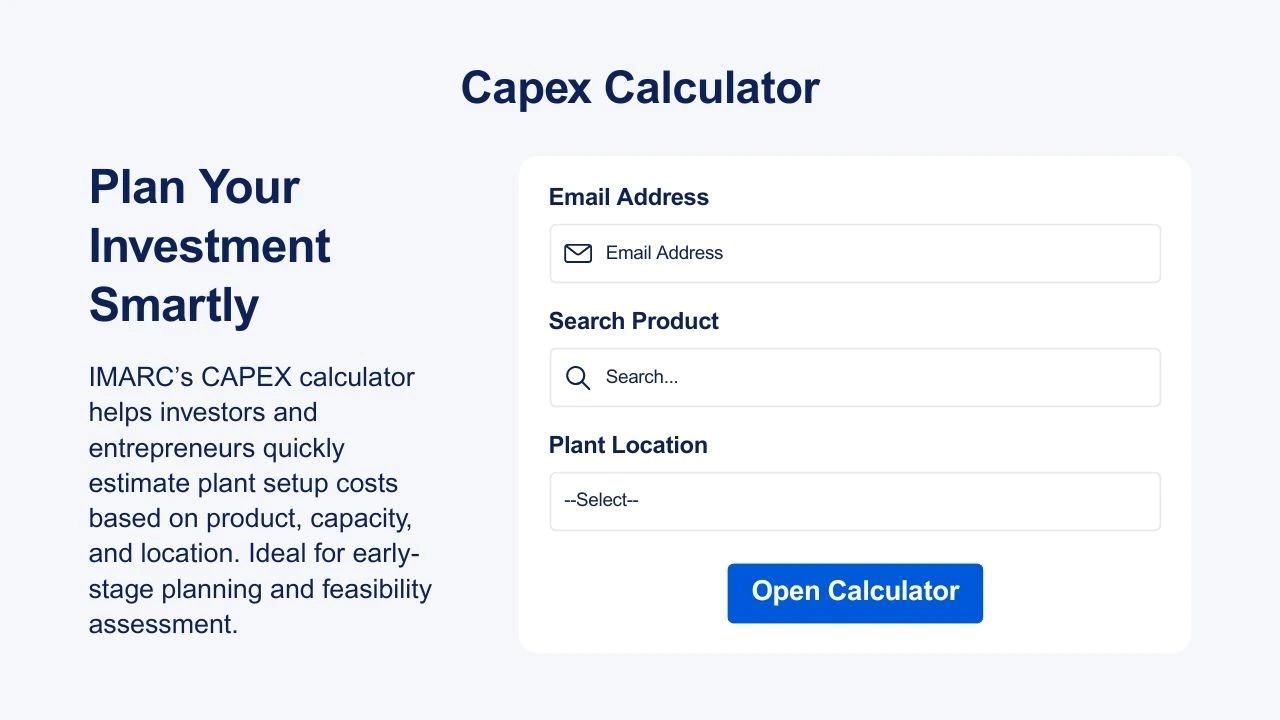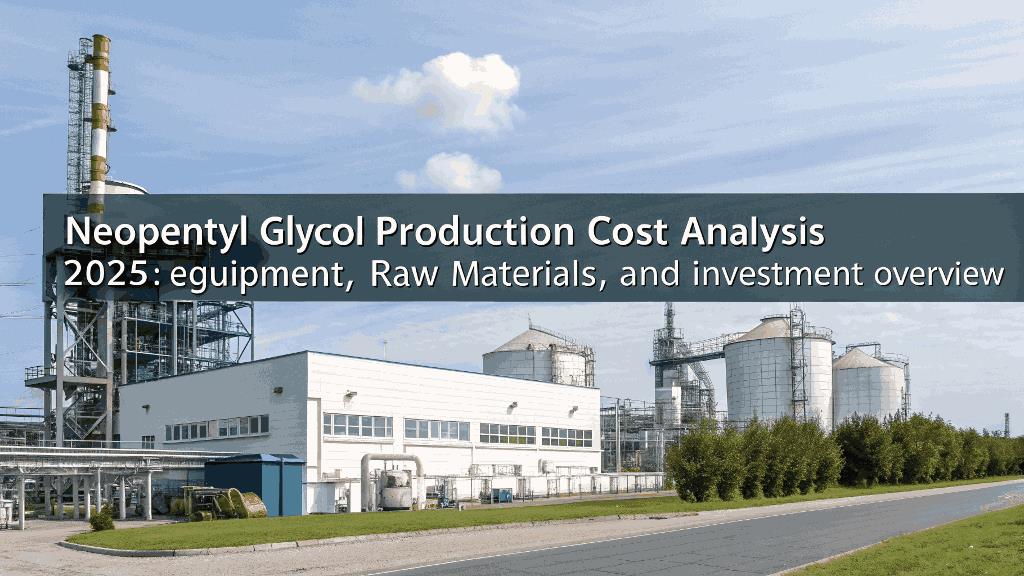
Neopentyl Glycol Production Cost Analysis 2025: Equipment, Raw Materials, And Investment Overview
Neopentyl Glycol (NPG) is a white, crystalline solid that's a key intermediate in the production of various industrial products. It's an important building block for manufacturing polyester resins, which are used in everything from coatings and adhesives to fiberglass and boat hulls. NPG's unique structure provides enhanced hydrolytic stability and weather resistance, making it a preferred component in high-performance applications. Its low volatility and high resistance to oxidation also make it useful in synthetic lubricants and plasticizers. Essentially, it's a versatile chemical that improves the durability and performance of the products it's incorporated into.
Setting up a neopentyl glycol production plant involves several key steps. First, you'll need to secure the necessary raw materials, primarily isobutyraldehyde and formaldehyde. A reaction vessel is required where these chemicals are mixed under controlled conditions, followed by a purification system to remove impurities. The product is then refined through a series of distillation and crystallization processes to achieve the desired purity. Finally, the plant needs storage facilities for the finished NPG and appropriate safety measures to handle the chemicals involved.
IMARC Group's report, titled “Neopentyl Glycol Production Cost Analysis 2025: Industry Trends, Plant Setup, Machinery, Raw Materials, Investment Opportunities, Cost and Revenue,” provides a complete roadmap for setting up a neopentyl glycol production plant. It covers a comprehensive market overview to micro-level information such as unit operations involved, raw material requirements, utility requirements, infrastructure requirements, machinery and technology requirements, manpower requirements, packaging requirements, transportation requirements, etc.
Request for a Sample Report: https://www.imarcgroup.com/neopentyl-glycol-manufacturing-plant-project-report/requestsample
Neopentyl Glycol Industry Outlook 2025
The Neopentyl Glycol (NPG) industry is poised for significant growth in 2025, driven by its essential role in various sectors. The chemical's unique properties, such as high thermal stability and weather resistance, make it a key component in high-performance coatings, resins, and lubricants. A major catalyst for this growth is the increasing demand from the automotive and construction industries, particularly in emerging economies. Furthermore, the global shift toward environmentally friendly, low-VOC (volatile organic compounds) products is propelling the use of NPG in powder coatings and other sustainable materials.
Key Insights for Neopentyl Glycol Production Plant Setup
Detailed Process Flow
-
Product Overview
Unit Operations Involved
Mass Balance and Raw Material Requirements
Quality Assurance Criteria
Technical Tests
Project Details, Requirements, and Costs Involved:
-
Land, Location and Site Development
Plant Layout
Machinery Requirements and Costs
Raw Material Requirements and Costs
Packaging Requirements and Costs
Transportation Requirements and Costs
Utility Requirements and Costs
Human Resource Requirements and Costs
Capital Expenditure (CapEx) and Operational Expenditure (OpEx) Analysis:

Project Economics:
-
Capital Investments
Operating Costs
Expenditure Projections
Revenue Projections
Taxation and Depreciation
Profit Projections
Financial Analysis
Profitability Analysis:
-
Total Income
Total Expenditure
Gross Profit
Gross Margin
Net Profit
Net Margin
Request for Customization: https://www.imarcgroup.com/request?type=report&id=7631&flag=E
Key Cost Components of Setting Up a Neopentyl Glycol Plant
-
Raw Materials: The largest operational expense, primarily for isobutyraldehyde and formaldehyde. Their fluctuating prices heavily influence production costs.
Machinery and Technology: This includes the cost of reactors, distillation columns, purification systems, and other process equipment. The technology chosen for the aldol condensation and hydrogenation steps is a major capital investment.
Infrastructure and Utilities: Costs associated with land acquisition, civil works, and off-site infrastructure like power, water, and steam supply. Energy consumption for various processes is a substantial ongoing utility cost.
Labor and Staffing: Wages for skilled and unskilled labor, including operators, engineers, and administrative staff.
Regulatory Compliance: Expenses for meeting environmental and safety standards, including waste treatment facilities and pollution control measures.
Economic Trends Influencing Neopentyl Glycol Plant Setup Costs 2025
-
Fluctuating Raw Material Costs: The cost and availability of key feedstocks, primarily isobutyraldehyde and formaldehyde, are volatile. Price increases from manufacturers like BASF in North America reflect these rising raw material costs.
Regional Economic Conditions: The strength of the construction and automotive sectors varies globally. Muted demand in some regions, like China's real estate market, can lead to oversupply and price reductions, while steady demand in others supports higher prices.
Supply Chain and Logistics: Global port congestion and other logistical disruptions can lead to shipment delays, inventory buildup, and increased transportation costs, impacting overall project expenses.
Environmental and Regulatory Factors: The shift towards sustainable production methods and a focus on low volatile organic compound (VOC) content can drive up costs for new plants due to the need for advanced, compliant technology.
Challenges and Considerations for Investors
-
Market Volatility : Prices for NPG are subject to fluctuations based on factors like feedstock costs (isobutyraldehyde and formaldehyde), which are tied to crude oil prices.
Supply Chain Disruptions : NPG production and distribution can be impacted by logistical bottlenecks, extreme weather events, and geopolitical tensions, leading to potential shortages and price changes.
Downstream Demand : The demand for NPG is heavily dependent on end-user industries, particularly construction and automotive. Slowdowns in these sectors can lead to a drop in NPG consumption.
Competition : The market is competitive, with major players and new entrants influencing pricing strategies and market share.
Regulatory Environment : Increasingly strict environmental regulations, especially concerning volatile organic compounds (VOCs), can shape market trends and create a demand for low-VOC alternatives, which NPG offers.
Conclusion
This report aims to serve as a practical guide for entrepreneurs, investors, and industrial planners exploring opportunities in neopentyl glycol production. By understanding the cost structure, market dynamics, and operational challenges, stakeholders can make informed decisions and devise sustainable strategies for entry and expansion in the sector.
About Us: IMARC Group is a global management consulting firm that helps the world's most ambitious changemakers to create a lasting impact. The company excel in understanding its client's business priorities and delivering tailored solutions that drive meaningful outcomes. We provide a comprehensive suite of market entry and expansion services. Our offerings include thorough market assessment, feasibility studies, company incorporation assistance, factory setup support, regulatory approvals and licensing navigation, branding, marketing and sales strategies, competitive landscape, and benchmarking analyses, pricing and cost research, and procurement research.
Contact Us:
IMARC Group
134 N 4th St., Brooklyn, NY 11249, USA
Email: sales[@]marcgroup.com
Tel No:(D) +91 120 433 0800
United States: (+1-201971-6302)
Legal Disclaimer:
MENAFN provides the
information “as is” without warranty of any kind. We do not accept
any responsibility or liability for the accuracy, content, images,
videos, licenses, completeness, legality, or reliability of the information
contained in this article. If you have any complaints or copyright
issues related to this article, kindly contact the provider above.


















Comments
No comment